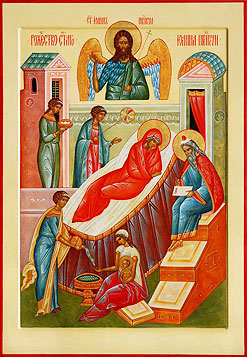Sermon by Archbishop Alypy (Gamanovich)
on the Nativity of St John the Forerunner
 Today we heard the Gospel reading on the remarkable circumstances surrounding the birth of John the Baptist, the greatest one born of woman, as the Savior Himself said. Today we heard the Gospel reading on the remarkable circumstances surrounding the birth of John the Baptist, the greatest one born of woman, as the Savior Himself said.
When Zechariah, being a priest, fulfilled his rotation in serving, while offering incense in the Temple, he saw an angel of the Lord. He trembled with fear, for the sight of an angel was received as witnessing the Lord Himself, which human nature cannot endure, and death follows.
But the angel consoled him: “Fear not, Zacharias: for thy prayer is heard; and thy wife Elisabeth shall bear thee a son, and thou shalt call his name John. And thou shalt have joy and gladness; and many shall rejoice at his birth. For he shall be great in the sight of the Lord, and shall drink neither wine nor strong drink; and he shall be filled with the Holy Ghost, even from his mother's womb” (Luke 1:13-15). The angel then proceeded to announce the purpose of his son, who with the spirit and power of Elijah would lead the people to faith, which they had misconstrued. And Zechariah said to the angel: “ Whereby shall I know this?”( Luke 1:18). The angel responded to his doubt: “I am Gabriel, that stand in the presence of God; and am sent to speak unto thee, and to shew thee these glad tidings. And, behold, thou shalt be dumb, and not able to speak, until the day that these things shall be performed, because thou believest not my words, which shall be fulfilled in their season” (Luke 1:19-20).
In all likelihood, Zechariah had been praying for a child when he and Elizabeth were young, but that time had passed. In old age, he likely prayed for the arrival of the Messiah, since according to the prophesy of Prophet Daniel, the time was approaching, since the scepter of Judah was taken from the kings of the Jews. King Herod, who is recalled in connection with the birth of John the Baptist, was and Edomite. He seized power and was confirmed by Rome, so the Jews did not consider him their own.
After this happened, Elizabeth bore a son in time. On the eighth day, they came to circumsize the child and wished to call him Zechariah in honor of his father, but the mother wished to call him John. When they asked the father through signs—for he was still deaf and dumb--about the name of his son, he asked for a tablet and wrote: “His name is John” (Luke 1:63). His tongue was loosened immediately, and he said: “Blessed be the Lord God of Israel; for he hath visited and redeemed his people” (Luke 1:68). His relatives then gathered, among whom was Mary, the future Mother of God. A great fear spread among the local population and the land of Judea, and people asked: “What manner of child shall this be!” (Luke 1:66).
The child grew and strengthened in the Spirit and went into the wilderness before he appeared to Israel.
The Gospel says nothing more about the young man’s life in the desert. But in the Minea of June 24, old style, St Dimitry of Rostov provides some details.
When our Lord Jesus Christ was born in Bethlehem, and the Magi came from Persia, they asked “Where is he that is born King of the Jews?” (Matthew 2:2). Herod grew anxious, deeming it a threat to his throne. He determined the date of the appearance of the star. But when the Wise Men, receiving instructions from an angel, took a different path back home, then Herod commanded that all male children in Bethlehem and its surroundings be slaughtered.
The wail of mothers even reached Hebron, and Elizabeth fled with her child to the hills. Seeing soldiers approach, she cried to a Cliffside: “Mountain of God! Receive this mother and child!”
The mountainside split open, revealing a cave, which Elizabeth and her child entered. By Divine Providence, a stream appeared near the cave, and a fig tree grew, full of fruit. The tree would bend down every meal time, and straighten again after fruit was taken.
Forty days after the martyrdom of Zechariah, Righteous Elizabeth died in the cave, and the young John continued to live in the wilderness under the care of an angel, until he became an adult.
When his time came, John the Baptist was called by God to fulfill the work for which he was chosen from birth. So John the Baptist came to preach in the Judean wilderness, saying “Repent ye: for the kingdom of heaven is at hand” (Matthew 3:2). For he was the one of whom the Prophet Isaiah said: “The voice of him that crieth in the wilderness, Prepare ye the way of the Lord, make straight in the desert a highway for our God” (Isaiah 40:3). Here we read of mountains and valleys, crooked and rough land, all symbols of human sins, which through repentance are smoothed out as we prepare our hearts to receive the Messiah, the Savior.
When the Kingdom of Heaven of which John the Baptist and the Savior preached was approaching, for us it has already arrived—this is the Church of Christ which Christ established after His suffering and Resurrection.
The repentance of which John the Baptist preached is real for us today. Now John the Baptist stands before the Throne of God and is a great intercessor. May his holy prayers help us reach the eternal Kingdom of Heaven through the Holy Church. Amen.
2011
|